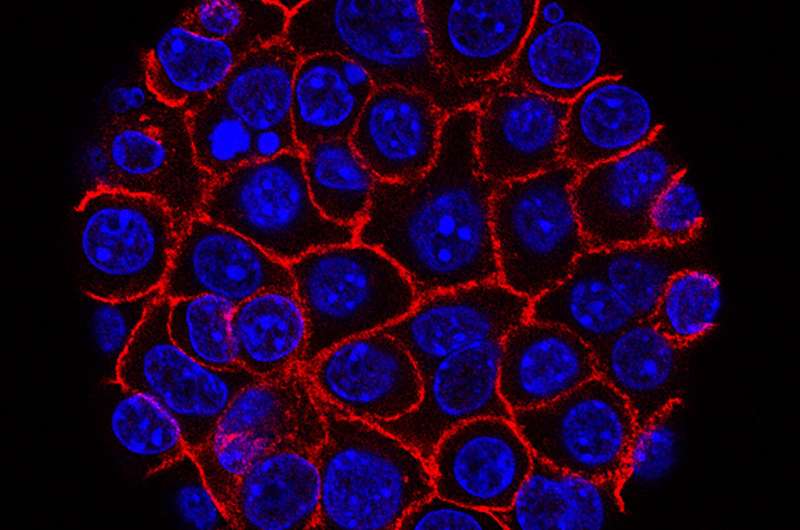Breast cancer cells rely on pyruvate to expand in new tissues

Most patients who die of breast cancer die of metastasis, the process by which cancer cells spread to other organs of the body. Cancer cells alter their metabolism to grow and expand across other organs. A new study by Prof. Sarah-Maria Fendt from the VIB-KU Leuven Center for Cancer Biology and her Ph.D. student Ilaria Elia has shown that breast cancer cells require the nutrient pyruvate to do this.
When cancer cells spread to different organs, and in particular to the lungs, they first need to reshape the healthy lung environment into a so-called metastatic niche that supports the growth of cancer cells. The enzyme that cancer cells need to activate this process is called collagen prolyl 4 hydroxylase. Until now, it was believed that the activity of this enzyme is regulated in both cancer and healthy cells by the amount of enzyme present. In other words, it is thought that if a lot of the enzyme is present its activity is high and vice versa. Since collagen prolyl 4 hydroxylase also has important functions in healthy cells, collagen prolyl 4 hydroxylase is a difficult cancer drug target because this would target cancer as well as healthy cells.
Prof. Sarah-Maria Fendt from the VIB-KU Leuven Center for Cancer Biology and her Ph.D. student Ilaria Elia have now discovered that breast cancer cells that reach the lung require the nutrient pyruvate to restructure the healthy lung environment so that cancer cells can grow into metastasis. Specifically, pyruvate drives the production of a small molecule called α-ketoglutarate. This small molecule regulates the activity of collagen prolyl 4 hydroxylase independently of the amount of this enzyme. Importantly, only cancer cells or cells supporting the spread of cancer cells to distant organs seem to rely on this pyruvate-dependent mechanism to create a pro-tumor environment in the lung. This means that inhibiting pyruvate uptake by breast cancer cells, is sufficient to greatly impair metastasis formation in different breast cancer mouse models.
Interestingly, in an independent study Prof. Geert Carmeliet and Dr. Steve Stegen (Lab of Clinical and Experimental Endocrinology, KU Leuven) have investigated how normal bone cells create a healthy environment using collagen prolyl 4 hydroxylase. They found that bone cells also require α-ketoglutarate to regulate the activity of collagen prolyl 4 hydroxylase resulting in normal bone development and regeneration. But differently to cancer cells, normal bone cells do not rely on pyruvate, but the nutrient glutamine for this important function. Currently, mouse models already exist to target cancer cells without harming healthy cells and vice versa by selectively changing the uptake of pyruvate or glutamine.
Overall, these two studies indicate that healthy and cancer cells use different nutrients to shape their environment. This novel insight can be used to develop new therapies that specifically target breast cancer cells that have spread to the lung, while sparing healthy cells.
More information: Ilaria Elia et al, Breast cancer cells rely on environmental pyruvate to shape the metastatic niche, Nature (2019). DOI: 10.1038/s41586-019-0977-x
















